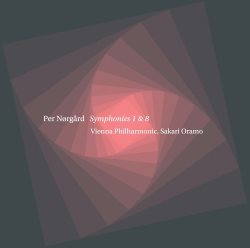| 
|
Per NØRGÅRD (b. 1932)
Symphony No. 1, ‘Sinfonia austera’, Op. 13 (1953-1955, rev. 1956) [31:04]
Symphony No. 8 (2010-2011) [26:05] *
* World premiere recording
Wiener Philharmoniker/Sakari Oramo
rec. Konzerthaus Wien, 16-17 May 2013 (Symphony No. 1); live, 25-26 May 2013 (Symphony No. 8)
reviewed as a 24/48 download
DACAPO 6.220574 SACD [57:09]
Dacapo continue to render sterling service to the cause of Danish
music, past and present. One of their most prestigious and rewarding
cycles, the symphonies of Rued Langgaard, is an artistic and technical
milestone (review)
and another – the so-called Nielsen Project with Alan Gilbert
and the New York Philharmonic - looks just as promising (review).
As for Per Nørgård the Dacapo recording of his opera
Der göttliche Tivoli was one of my picks for 2010 (review).
After the surreal comedy and stark tragedy of that excoriating piece
the ‘tantalising tone-feasts’ of A Light Hour
find the composer in a much more relaxed and accessible mood (review).
This coupling of his First and Eighth symphonies – his oldest
and newest – is important, not least because it features the
Wiener Philharmoniker in repertoire one doesn’t associate with
them. On the podium is the Finnish conductor Sakari Oramo, whose guest
appearances and continuing tenure as chief conductor of the BBC Symphony
have won him many friends in the UK. That said, I was left somewhat
dispirited by the first instalment of his BIS/Nielsen cycle with the
Royal Stockholm Philharmonic (review).
As good as Oramo’s Swedish band undoubtedly is, having the mighty
WP between the shafts must have been a very enticing prospect indeed.
But what would this orchestra – renown for its big, refulgent
sound - make of a symphony subtitled ‘Sinfonia austera’?
From the outset it’s clear that Nørgård‘s
First Symphony - modelled on Sibelius’s - has all the
brooding intensity that one associates with that formidable figure.
That said, there’s an astonishing muscularity to Nørgård’s
writing that soon had me in its unyielding grip; as for the WP, they
are at once crystal clear and darkly sonorous.
The opening Tempo moderato is full of ear-pricking incident,
and Oramo has a firm hold on the reins at all times. Happily the symphony
has a strong narrative and the composer’s subtle spatial effects
– superbly captured by the Dacapo team – couldn’t
be more atmospheric or exciting. For an early opus this is remarkably
assured, and despite the composer’s acknowledged debt to Sibelius
he speaks here with a voice that’s very much his own.
The Calmo molto affetuoso, with its grumbling timps and sombre
pizzicati. is louring but not at all lugubrious. Most telling
here is the depth and weight of sound that Oramo draws from this orchestra,
whose various sections distinguish themselves at every turn. The concluding
Allegro may not be as impetuous as its marking demands, but
those who know and love Nielsen’s symphonies will surely cleave
to this cool, clear-eyed music. The recording continues to impress,
its sophistication evident in a wide, deep soundstage and panoplies
of complex timbres. Musically and technically the cumulative power
of the closing pages will take your breath away.
What a difference half a century makes, for the Eighth Symphony
combines lighter textures with gentle calls and susurrations. Indeed,
at times it’s as if Nørgård is writing for an enlarged
chamber group, such is the transparency of the work’s internal
banter, its good-humoured toing and froing. No dour Danes here, just
a master revelling in his craft; I daresay the players also enjoyed
the composer’s delicate and delightful constructs. This is wonderfully
tactile and immersive music, very much a ‘tone-feast’
in its own right.
The discreet shimmer and shake of the Adagio molto is no
less absorbing; it may seem paradoxical, but this music is at once
plain and complex, reserved and impulsive, and it's crowned with some
of the loveliest, most caressing sounds imaginable. What a garden
of earthly delights this is, exotic and embracing, a feast for the
ear and the mind’s eye. As for the concluding Più
mosso – Lento visionario its fruited interjections, patter
of tom toms and dry bass-drum thuds merely underline that sense of
a strange but covetable otherness. Yes it’s been done before,
but not with such penetrating clarity or panache.
There’s no doubt that apart from the striking confidence and
originality of these scores the playing of this peerless band has
much to do with the success of this recording. Make no mistake, Oramo
proves himself a sensitive and stylish interpreter of these symphonies;
indeed, I did wonder if Oramo's Nielsen would have jelled for me if
he'd been conducting the Vienna Phil rather than the Stockholm one.
Idle fancies aside Oramo has done an impeccable job here, as have
the recording engineers. Rarely have I heard a live recording –
in this case the Eighth Symphony - so without blemish or
hint of compromise. The audience is mouse-quiet and there’s
no applause. As always Jens Cornelius’s booklet notes reflect
his enthusiasm for the music at hand.
Two very different works, supremely well played, conducted and recorded;
surely one of the year's finest symphonic releases thus far.
Dan Morgan
twitter.com/mahlerei
 |
 |
|














